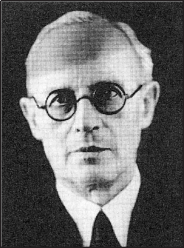- SABANEEV
- RUSSIA (see also List of Individuals)\
 27.6.1886 Rodiondzevo/RU - 31.3.1955 Leningrad/RU\Arkady Arkadievich Sabaneev graduated in 1920 as an electro-technical engineer from the Leningrad Polytechnic Institute LPI. He became a collaborator of Nikolai Nikolaevich Pavlovsky (1884-1937) at LPI Hydraulic Laboratory which was then a part of the Scientific Melioration Institute and became in 1930 the Scientific Research Institute NIIG and from 1940 finally merged to the present VNIIG.\Sabaneev was one of the first collaborators of the Leningrad hydraulic laboratory and thus designing the basic laboratory equipment. The first laboratory flume was 4.2 m wide, 10 m long and 0.60 m high, and used for studying sand movement in rivers and discharge measurement devices during the early stages of VNIIG. Later, Sabaneev turned to the hydraulic analysis of hydropower stations, such as the Volkhovskaya scheme on River Volkhov. He was particularly interested in the formation of hydraulic jumps following the abrupt transition from supercritical to subcritical flow, a phenomenon mainly investigated in France and Germany and later particularly considered by Dimitri Riabouchinsky (1882-1962) as a transition phenomenon in aerodynamics. Sabaneev also proposed a novel spillway type that incorporated a particular design of stilling basin, in the same period as Theodor Rehbock (1864-1950) investigated his end sill arrangement for better performance of the transition between spillway and the tailwater. Sabaneev considered in addition arrangements that responded to problems with ice and debris flows over a spillway. His designs were later adopted for the hydropower schemes on the Dniepr, the Svir and the Volga Rivers. He also worked in hydraulic questions relating to general laboratory modeling and may be considered an initiator and pioneer of the successfully era of VNIIG hydraulic engineering.\Anonymous (1955). A.A. Sabaneev. Izvestiya VNIIG 54: 229-230 (in Russian). PPuck, A.P. (1996). A.A. Sabaneev. The history of VNIIG, named after B.E. Vedeneev. Izvestiya VNIIG 229: 19-20 (in Russian). PSabaneev, A.A. (1931). Distribution of pressures in steady liquid flow. Izvestiya VNIIG 1: 82. Sabaneev, A.A. (1947). Universal formula for Chezy coefficient. Izvestiya VNIIG 32: 27-44. Sabaneev, A.A. (1947). On the limitations of empirical formulae for the Chezy coefficient. Izvestiya VNIIG 34: 17-32.Sabaneev, A.A. (1955). On elements of hydraulic engineering not amenable to hydraulic modeling. Izvestiya VNIIG 54: 151-161 (in Russian).
27.6.1886 Rodiondzevo/RU - 31.3.1955 Leningrad/RU\Arkady Arkadievich Sabaneev graduated in 1920 as an electro-technical engineer from the Leningrad Polytechnic Institute LPI. He became a collaborator of Nikolai Nikolaevich Pavlovsky (1884-1937) at LPI Hydraulic Laboratory which was then a part of the Scientific Melioration Institute and became in 1930 the Scientific Research Institute NIIG and from 1940 finally merged to the present VNIIG.\Sabaneev was one of the first collaborators of the Leningrad hydraulic laboratory and thus designing the basic laboratory equipment. The first laboratory flume was 4.2 m wide, 10 m long and 0.60 m high, and used for studying sand movement in rivers and discharge measurement devices during the early stages of VNIIG. Later, Sabaneev turned to the hydraulic analysis of hydropower stations, such as the Volkhovskaya scheme on River Volkhov. He was particularly interested in the formation of hydraulic jumps following the abrupt transition from supercritical to subcritical flow, a phenomenon mainly investigated in France and Germany and later particularly considered by Dimitri Riabouchinsky (1882-1962) as a transition phenomenon in aerodynamics. Sabaneev also proposed a novel spillway type that incorporated a particular design of stilling basin, in the same period as Theodor Rehbock (1864-1950) investigated his end sill arrangement for better performance of the transition between spillway and the tailwater. Sabaneev considered in addition arrangements that responded to problems with ice and debris flows over a spillway. His designs were later adopted for the hydropower schemes on the Dniepr, the Svir and the Volga Rivers. He also worked in hydraulic questions relating to general laboratory modeling and may be considered an initiator and pioneer of the successfully era of VNIIG hydraulic engineering.\Anonymous (1955). A.A. Sabaneev. Izvestiya VNIIG 54: 229-230 (in Russian). PPuck, A.P. (1996). A.A. Sabaneev. The history of VNIIG, named after B.E. Vedeneev. Izvestiya VNIIG 229: 19-20 (in Russian). PSabaneev, A.A. (1931). Distribution of pressures in steady liquid flow. Izvestiya VNIIG 1: 82. Sabaneev, A.A. (1947). Universal formula for Chezy coefficient. Izvestiya VNIIG 32: 27-44. Sabaneev, A.A. (1947). On the limitations of empirical formulae for the Chezy coefficient. Izvestiya VNIIG 34: 17-32.Sabaneev, A.A. (1955). On elements of hydraulic engineering not amenable to hydraulic modeling. Izvestiya VNIIG 54: 151-161 (in Russian).
Hydraulicians in Europe 1800-2000 . 2013.
